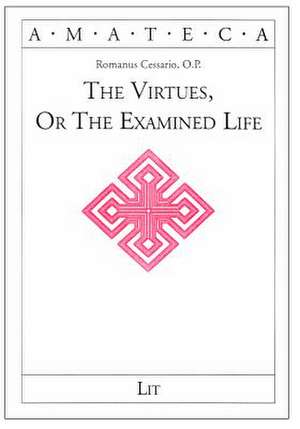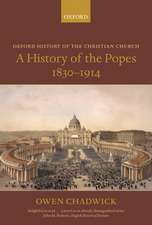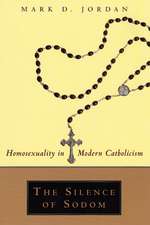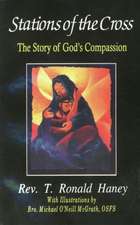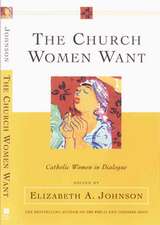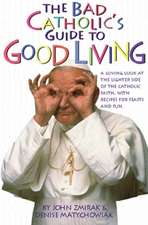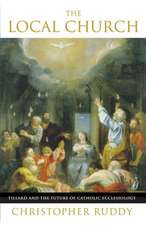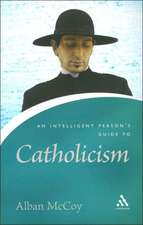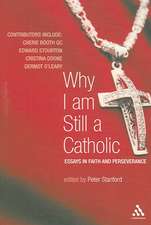The Virtues, or the Examined Life: Amateca, cartea 3
Autor Romanus Cessarioen Limba Engleză Paperback
Preț: 368.45 lei
Nou
Puncte Express: 553
Preț estimativ în valută:
70.50€ • 73.76$ • 58.57£
70.50€ • 73.76$ • 58.57£
Carte indisponibilă temporar
Doresc să fiu notificat când acest titlu va fi disponibil:
Se trimite...
Preluare comenzi: 021 569.72.76
Specificații
Cuprins
Part I: The Theological Virtues1. Faith and the Life of Christian Virtue2. Theological Hope and Christian Expectation3. Theological Charity and CommunioPart II: The Moral Virtues4. Christian Prudence and Practical Wisdom5. Christian Justice and Human Society6. Fortitude and the Courage of Christ7. Christian Moderation and Temperance
Recenzii
[bad] "While the author of this handbook of Catholic theology addresses the virtues from a traditional perspective, the book offers very little to the contemporary debate on 'virtue,' 'justice' and 'duty.'" --Catholic Library World, December 002
"provides a thorough introduction to Aquinas's theology of the virtues. The great achievement of the book consists in displaying how the analysis of the theological and cardinal virtues provides a richly textured, supply outline of the Christian life...Cessario successfully advances in concrete form a tradition-constituted and ecclesially normed moral theology." --Matthew Levering, The Thomist, January 2003
"A distinguished contribution to an international series of 'handbooks of Catholic theology,' this one by a Dominican teaching at St. John's Seminary in Boston...This is one handbook that theologians and moralists will want to keep at hand." -First Things
"For close to fifteen years now, moral theologians have benefited from the prolific work of Fr. Romanus Cessario in the area of moral theology. While churning out first-rate books and articles at a rapid pace, his expertise as a former teacher of dogmatic theology is evident in all of his work-and the present book under review, The Virtues, or the Examined Life, is no exception...[A]dd Cessarios's retrieval of the Thomistic moral tradition in The Virtues to a growing list of superb Thomistically-inspired works of moral theology in English. It will serve as a breath of fresh air for those used to a legalistic moral theology framed in categories of law obligation." -Mark S. Latkovic, Josephinum Journal of Theology
"C.'s discussion of justice is the most brilliant and helpful in this work...As we read his [Cessario's] rigorous analysis and observe his devotion of Mary, we see that C. himself is demonstrating the virtues of knowledge and piety in his theological reflection." -Theological Studies, 6/04
"provides a thorough introduction to Aquinas's theology of the virtues. The great achievement of the book consists in displaying how the analysis of the theological and cardinal virtues provides a richly textured, supply outline of the Christian life...Cessario successfully advances in concrete form a tradition-constituted and ecclesially normed moral theology." --Matthew Levering, The Thomist, January 2003
"A distinguished contribution to an international series of 'handbooks of Catholic theology,' this one by a Dominican teaching at St. John's Seminary in Boston...This is one handbook that theologians and moralists will want to keep at hand." -First Things
"For close to fifteen years now, moral theologians have benefited from the prolific work of Fr. Romanus Cessario in the area of moral theology. While churning out first-rate books and articles at a rapid pace, his expertise as a former teacher of dogmatic theology is evident in all of his work-and the present book under review, The Virtues, or the Examined Life, is no exception...[A]dd Cessarios's retrieval of the Thomistic moral tradition in The Virtues to a growing list of superb Thomistically-inspired works of moral theology in English. It will serve as a breath of fresh air for those used to a legalistic moral theology framed in categories of law obligation." -Mark S. Latkovic, Josephinum Journal of Theology
"C.'s discussion of justice is the most brilliant and helpful in this work...As we read his [Cessario's] rigorous analysis and observe his devotion of Mary, we see that C. himself is demonstrating the virtues of knowledge and piety in his theological reflection." -Theological Studies, 6/04
